MercoPress. South Atlantic News Agency
Tag: British Antarctic Survey
-
Monday, January 25th 2021 - 08:59 UTC
South Georgia Patagonian toothfish fishery recertified with flying colors

Following its five-yearly Marine Stewardship Council (MSC) assessment, the South Georgia Patagonian toothfish longline fishery has, for the third time, been certified as a sustainable and well-managed fishery, according to the newsletter from the government of South Georgia and the South Sandwich Islands.
-
Monday, January 25th 2021 - 08:51 UTC
Gentoo penguins in South Georgia enjoying an enlarged no-fishing zone
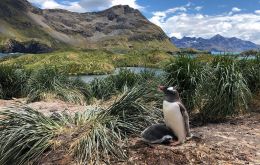
Gentoo penguins are benefiting from a newly enlarged no-fishing zone (known as a No-Take Zone NTZ) around the sub-Antarctic island of South Georgia following British Antarctic Survey (BAS) tracking research commissioned by the RSPB.
-
Saturday, December 19th 2020 - 09:50 UTC
A68a iceberg heading for South Georgia shifts direction and loses a chunk of mass
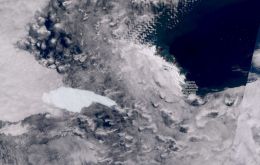
Strong currents have taken hold of a massive Antarctic iceberg that is on a collision course towards South Georgia Island, causing it to shift direction and lose a major chunk of mass, a scientist tracking its journey said on Friday.
-
Thursday, December 3rd 2020 - 09:39 UTC
RRS Sir David Attenborough delivered, BAS readies for intensive training and Arctic ice trials next year
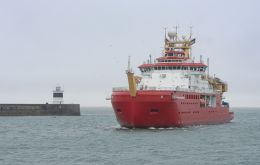
Britain’s new polar ship, the RRS Sir David Attenborough, has been handed over from Cammell Laird shipyard to the Natural Environment Research Council, NERC. Operated by British Antarctic Survey (BAS), the new polar ship will transform UK research in the polar regions. Its missions will be critical for understanding and making sense of our changing climate.
-
Thursday, December 3rd 2020 - 08:58 UTC
BAS celebrates Antarctica Day promoting polar science to classrooms in UK, US and Canada
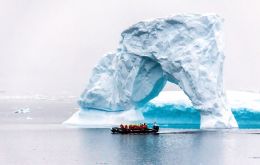
British Antarctic Survey (BAS) celebrated Antarctica Day in 2020 on December first, with a series of activities to highlight the importance of Antarctic research and operations during a year that marked the 200th anniversary of the discovery of the continent.
-
Monday, May 25th 2020 - 07:16 UTC
South Georgia's new £11million wharf facilities completed in 108 days
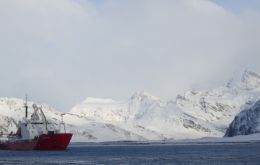
Surrounded by spectacular scenery, dominated by mountains and glaciers, construction has completed on a new £11million wharf, dolphin, and slipway to serve the King Edward Point Research Station (KEP), in South Georgia Island.
-
Thursday, April 30th 2020 - 07:30 UTC
Drilling in Antarctica to take bedrock samples from beneath the ice sheet

Two new research projects – in partnership with British Antarctic Survey engineers – will drill deeper than ever before in Antarctica and in space. The first project, called INCISED, is led by the University of Durham, funded by the European Research Council, and has set its sights on the Antarctic. It will drill bedrock from beneath the polar ice sheets, with the goal being to retrieve scientific samples.
-
Tuesday, April 28th 2020 - 15:35 UTC
New research shows sustainable fishing and conservation can coexist
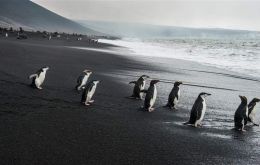
By surfbirds (*) – Our oceans are in trouble. Globally, poor fishing practices are directly damaging to marine wildlife, and overfishing can deplete food resources for animals such as seabirds and seals. However, research by BirdLife's Marine Program, in association with scientists from the British Antarctic Survey, (BAS) and the RSPB (BirdLife in the UK), shows that under current climate conditions, sustainable fisheries can exist alongside conservation measures for seabirds and seals in a well-managed Marine Protected Area.
-
Tuesday, February 25th 2020 - 07:30 UTC
South Georgia is evidence of whales recovery, a century after they were heavily exploited
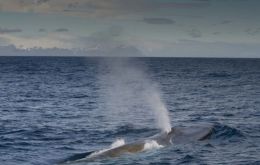
A team led by the British Antarctic Survey has just returned from the sub-Antarctic island of South Georgia, as the last of three expeditions to investigate the recovery of whales a century after they were heavily exploited. After 30 years of protection, large numbers of whales appear to be returning to the region.
-
Tuesday, February 18th 2020 - 06:38 UTC
Falklands' port development partner is also modernizing BAS Rothera station and a new wharf for RRS Sir David Attenborough
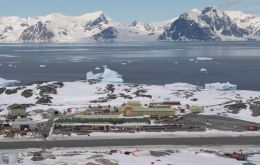
BAM Nuttall Ltd, which has been selected by the Falkland Islands Government, FIG, as the development partner to design and build a new port in Stanley Harbour is no adventurer in the South Atlantic and is closely linked to the UK efforts and investments in Antarctica. In effect, BAM Nuttall is involved in the building of the British Antarctic Survey's largest facility at Rothera Research station.
